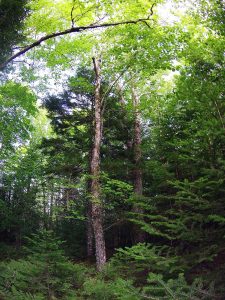
Multi-aged, mixed Acadian forest on a private woodlot in Nova Scotia provides many ecosystem services
MES Thesis Defence
GIFTS TO A FUTURE WORLD: CONVERSATIONS WITH WOODLAND OWNERS IN NOVA SCOTIA
By Andrew W. Kekacs
Abstract:
Private, non-industrial woodland owners provide more than half of the timber used by Nova Scotia’s forest products industry. Research, however, suggests many of these owners do not consider income from timber sales to be their primary reason for owning woodland. This study aimed to reach a holistic understanding of their attitudes and motivations using walking interviews on the owners’ woodlands and a grounded theory approach to analysis, in which explanations of the phenomena under study are induced from the data rather than being based on responses to survey questions or derived from a priori hypotheses. Forest landowners interviewed for this research were most concerned with the conservation – and ultimately the conveyance – of values that provide them with no immediate economic returns. The high value placed on these “gifts to a future world” offers a new way to think about the design of programs meant to encourage active management of private forestland.
Tuesday, August 1, 2017 @ 10:00 A.M.,
Room 5001, Kenneth C. Rowe Management Building
6100 University Ave., Halifax, NS
From Andrew Kekacs LinkedIn profile (publicly available)
– Executive Director of NSWOOA Mar 2012-present
– Communications Director, Small Woodland Owners of Maine, 2007-2010
… University of Connecticut, BA in Journalism (1982); graduate level studies in economics at Trinity College, Hartford
“The [MES degree at Dal] builds on 30 years of experience in natural resources and sustainability issues. My thesis looks at the changing beliefs and motiviations of people who own small forested parcels in Nova Scotia. Other areas of study include environmental and social impact assessment, biodiversity conservation, and environmental informatics.”
